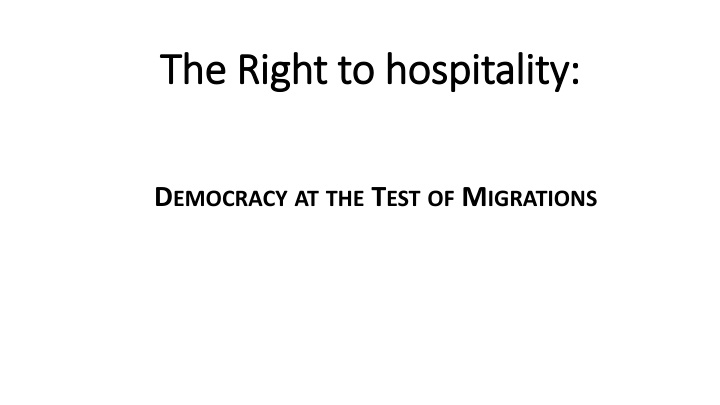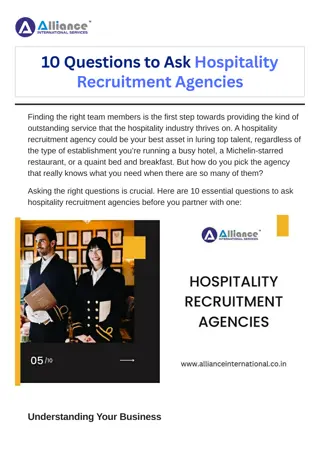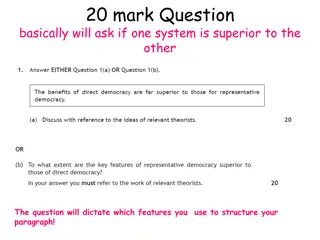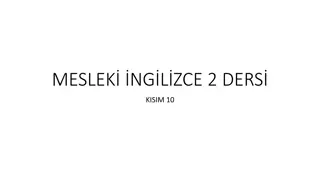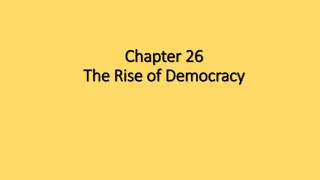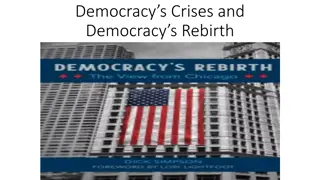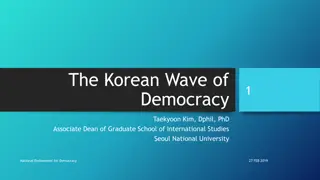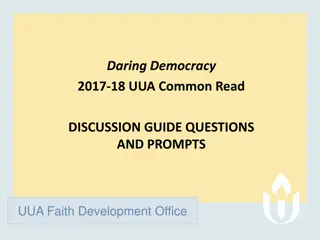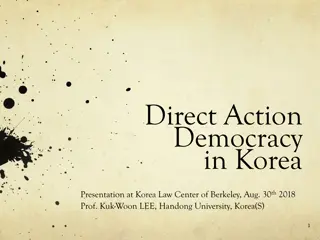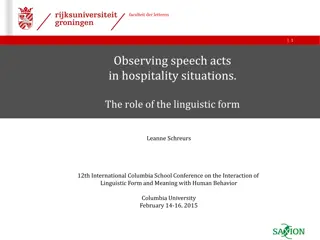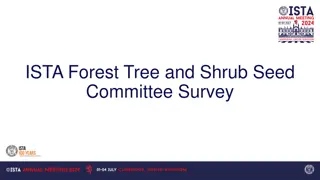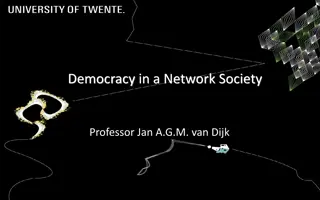The Right to Hospitality: Democracy Tested by Migrations
Explore the intersection of democracy and migration, examining the challenges and implications of the notion of hospitality within the political landscape. Insights from various scholars highlight the complex relationship between the foreigner, democracy, and the rights of individuals. The discourse delves into the dynamics of people's sovereignty, state sovereignty, and the evolving concepts of citizenship and equality in political societies.
Download Presentation

Please find below an Image/Link to download the presentation.
The content on the website is provided AS IS for your information and personal use only. It may not be sold, licensed, or shared on other websites without obtaining consent from the author.If you encounter any issues during the download, it is possible that the publisher has removed the file from their server.
You are allowed to download the files provided on this website for personal or commercial use, subject to the condition that they are used lawfully. All files are the property of their respective owners.
The content on the website is provided AS IS for your information and personal use only. It may not be sold, licensed, or shared on other websites without obtaining consent from the author.
E N D
Presentation Transcript
The Right to hospitality: The Right to hospitality: DEMOCRACY AT THE TEST OF MIGRATIONS
A deflationary interpretation of "people's sovereignty. Equal freedom as a vehicle for the democratization of political regimes
The modern foreigner is a particular figure of the foreigner. Dani le Lochak: What ultimately characterizes the figure of the foreigner of the nation-state is its politicisation : The foreigner is defined as a non-national and (inseparably) as a non-citizen one who does not belong in the political community constituted as a state . Democracy = people's sovereignty = state sovereignty [ ] there is a crucial link between democratic self-governance and territorial representation [ ] Democratic laws require closure precisely because democratic representation must be accountable to a specific people. (Seyla Benhabib, The Rights of Others)
The Austrian historian Gerald Stourzh once observed that foreigner is a status distinction (of inferior rank), the only one that has resisted until now to the process of equalization of rights that was initiated in the late eighteenth century. But this resistance cannot be overcome, since the status of foreigner is the projected shadow of the status of national-citizen.
Etienne Balibar Equaliberty, Duke University Press, Durham and London, 2014 The Declaration of 1789 integrally identifies the rights of man with political rights [ ], man, individual and collective, with a member of political society [ ] It goes to the idea of the right of man to politics, to politically institute all human activity in view of a liberation and equalization .
Neither physical safety being fed by some state or private welfare agency nor freedom of opinion change in the least their fundamental situation of rightlessness. The prolongation of their lives is due to the charity and not to the right, for no law exists which could force the nations to feed them; their freedom of movement, if they have it at all, gives them no right to residence which even the jailed criminals enjoy as a matter of course; and their freedom of opinion is a fool s freedom, for nothing they think matters anyhow. (Hannah Arendt, The Origins of Totalitarianism, p. 296)
Ayelet Shachar: The Shifting Border of Immigration Regulation , Stanford Journal of Civil Rights & Civil Liberties, Vol. 3, 2007 Dani le Lochak: When police laws become increasingly coercive, they hinder such basic rights as the freedom to come and go, the right to family life, the rights to health, etc. The affirmation of full equal rights become completely meaningless.
Universal Declaration of Human Rights (1948) merely presents the principles it sets out as a common standard for all peoples and all nations to the end that every individual and every organ of society, keeping this Declaration in mind, shall strive by teaching and education to promote respect for these rights and freedoms and by progressive measures, national and international, to secure their universal and effective recognition and observance, both among the peoples of Member States and among the peoples of territories under their jurisdiction .
Kant Kant The Contest of Faculties True enthusiasm is always directed directly exclusively towards the ideal, particularly towards what is purely moral (such as the concept of right).
KANT, The Science of Right KANT, The Science of Right There is only one Innate Right, the Birthright of Freedom. Freedom is independence of the compulsory will of another; and in so far as it can coexist with the freedom of all according to a universal law, it is the one sole original, inborn right belonging to every man in virtue of his humanity. There is, indeed, an innate equality belonging to every man which consists in his right to be independent of being bound by others to anything more than that to which he may also reciprocally bind them. It is, consequently, the inborn quality of every man in virtue of which he ought to be his own master by right (sui juris).
MICHEL AGIER L encampement du monde , Plein droit, 2011/2, n 90 La condition cosmopolite, Paris, La D couverte, 2013 (dir.): Un monde de camps, Paris, La D couverte, 2014
K KANT ANT, , again again Science of Right, 13: Had the surface of the earth been an infinite plain, men could have been so dispersed upon it that they might not have come into any necessary communion with each other, and a state of social community would not have been a necessary consequence of their existence upon the earth. Nachlass: Every man has an innate right to be in some place on earth, because his existence is not a factum [an act], therefore it cannot be unjustum Seyla Benhabib: What is the status of this fact in Kant s moral argument? If indeed we were to assume that Kant used the sphericity of the earth as a justificatory premise, wouldn t we have then to conclude that he had committed the naturalistic fallacy? Just because all castles everywhere are build on sand, it still does not follow that mine should be so build as well.
The modern conception of right is incompatible with exclusion. A political structuration of the world that prevents some human beings from finding a place on earth to live freely compromises the normative foundations of modern rights. Not only is the surface of the planet finished, as Kant pointed out, but this surface, at least its habitable places, is entirely occupied: there are no longer any places on earth where human beings whom political repression, war or misery drive out of their countries could settle with some chance of rebuilding their lives.
CONCLUSION 1 1) It is essential to distinguish between rights and protections . Didier Fassin: Humanitarian reason. A Moral History of the Present, Univ. of California Press, London 2012 2) The confusion between rights and protections contaminates the rights of citizens themselves. Only if a right of the poor is presupposed as a legal-social fiction, is aid to the poor removed from the arbitrariness and no longer dependent on the contingent state of finances and other uncertain factors. (Georg Simmel, On Poverty)
C CONCLUSION ONCLUSION 2 2 1) The right to hospitality, e.g. the right of each human being to have a place on the earth to live free, is undisputable. Kant: originally, no one had more right than another to a particular part of the earth. 2) The right to hospitality is not an enforceable right, in the sense of positive law. But there is a corresponding duty, which is not first and foremost a duty to welcome people "into our homes", but a duty to act by all available means to transform the world that produces poverty and immigration. And as long as this transformation is still pending, the duty of hospitality is imperative for States that are considered democratic, however difficult it may be to organize it in practice.
